Reviews
October 1, 2012
Version française...
Flash version here.
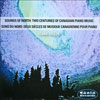 Sounds of North: Two Centuries of Canadian Piano Music Sounds of North: Two Centuries of Canadian Piano Music
Elaine Keillor, piano
Gala Records Gala-108 (4 CDs: 5 h 2 min 19 sec)

A professor and researcher at Carleton University, pianist Elaine Keillor offers a true anthology of Canadian piano repertoire, bringing together works dating from 1807 to 2010. Her approach is didactical to a certain extent, mainly because the first three discs are almost entirely composed of works published by the Canadian Musical Heritage Society. Although the anthological ambition is interesting, the musical product is unfortunately variable. The first disc is far from stirring (except for the pleasant ragtimes that close the chapter) and the other discs offer a variety of works ranging from interesting to average. It is surprising to find a limited selection of works from major composers (such as works for youth by Rodolphe Mathieu, Violet Archer and Claude Champagne) and shameful that certain recognized composers are missing (André Mathieu, Harry Somers, François Morel...). Nonetheless, this voyage through our national repertoire is interesting and unearths works here and there that should be performed more often in recitals. Piano lovers and listeners with a liking for our national repertoire alike will be delighted. Éric Champagne
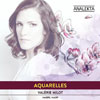 Aquarelles Aquarelles
Valérie Milot, harp
Analekta AN 2 9986 (61 min 59 s)

In a previous recording dedicated to chamber music with harp, Valérie Milot pleasantly surprised her listeners with her solid virtuosity, lamenting the meagre solo repertoire available for her unexpectedly complex instrument. Her latest CD features transcriptions of popular piano works: Satie’s three Gymnopédies, Debussy’s Clair de lune, Liszt’s third Liebesträume, and Albeniz’s Zaragoza, each uniquely evocative and barely reminiscent of their original versions, unlike Smetana’s The Moldau, which is void of colour. Three rare and complex works from the first half of the last century speak a different language altogether: Marcel Tournier’s Images, Suite no 4 (1932) in three movements, Marius Flothuit’s Pour de Tombeau d’Orphée (1950) and Henriette Rénié’s Légende (1901). Their writing style, one that could be considered more idiomatic, exploits both the musical and technical resources of an instrument far too often confined to an orchestral setting. Alexandre Lazaridès
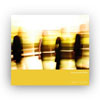 Amor Y Guerra Amor Y Guerra
Spanish Renaissance Music
Ensemble Alkemia

Recorded at the Saint-Germain church in Outremont, Montreal’s Ensemble Alkemia dedicated their CD to the Spanish manuscript Chansonnier du Palais. The ensemble’s four singers accompany themselves on various period instruments, in this case, recorders, pipes, wheel fiddles and percussion. The 16th-century manuscript showcases impressive solo and polyphonic vocal pieces. Despite the enthusiastic yet composed interpretation, in tune and faultless, the talented artists deserved a better production for their first record. The vocal textures unfortunately sound “stiff” on the occasion. Whether due to the sound recording or the digital production, more financial resources would have been welcome. We can imagine what thorough success the ensemble would have had with a prestigious record label like ATMA, Analekta or Fidélio. René F. Auclair
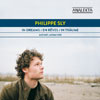 In Dreams: Songs by Schumann, Ravel, Ropartz, and Dove In Dreams: Songs by Schumann, Ravel, Ropartz, and Dove
Philippe Sly, bass-baritone; Michael McMahon, piano
Analekta AN2 9836 (64 min 8 s)

Bass-baritone Philippe Sly swept all the major prizes at the 2012 Montreal International Musical Competition, wowing audience and critics alike. As Cadmus in the recent COC Ensemble Studio performance of Semele, he combined exceptional vocalism with charismatic stage presence. He has since joined the San Franciso Opera’s Adler Fellowship program and is well on his way to a major career. For those not familiar with his voice, this debut solo album is a great introduction. On the disc is Schumann’s Dichterliebe, which Sly sings with refulgent tone and a poet’s sensitivity. For a bass-baritone, Sly has an exceptional top register, which rings out thrillingly, tossing off the high A in “Ich grolle nicht” with consummate ease. The high tessitura of Ravel’s Don Quichotte à Dulcinée poses no terror for him. Given his terrific top voice without a trace of “bottom heaviness,” it remains to be seen if Sly will move up the vocal ladder—after all, he is only 23! The rest of the disc is less familiar: six songs by Ropartz based on text by Heine that also inspired Schumann for his Dichterliebe; and the Three Tennyson Songs composed for Sly by Jonathan Dove. Michael McMahon is masterful at the piano, offering the singer exemplary support. The booklet has artist bios, an informative essay by Lucie Renaud, a few words by Sly himself, but unfortunately no texts and translations. This is clearly the outstanding debut disc of 2012. Joseph K. So
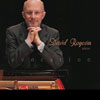 Evocation Evocation
David Rogosin, piano
Taiga Records TR-112 (68 min 09 s)

David Rogosin is a professor at Mount Allison University in New Brunswick. He is also a pianist. Evocation is his second record bearing the Taiga label. The chosen repertoire is vast, travelling through both time and space within a sort of multi-dimensional, panoramic view. Europe neighbours the New World, while Baroque runs alongside classicism, impressionism and contemporary music. The Scarlatti (three short) and Haydn (No. 62) sonatas showcase a good sense of precision and balance, but do not reveal any real “vision” of the music. It’s skillful; that’s it. Rogosin (as the title of the CD suggests) appears to be more inspired by the ephemeral and subtle coloured worlds of Albéniz (Evocacion), Mompou (La Fuente y la Campana) and especially Ravel (a lovely Jeux d’eau). He infuses life into Morel’s Étude de Sonorité no. 2 and demonstrates his fervent support for Ann Southam’s work (Simple Lines of Inquiry and Rivers), which he interprets with inspiration. The sound recording is lacking a little clarity, occasionally submerging the listener in a somewhat opaque sound mass. Frédéric Cardin
 Incandescence Incandescence
David Rogosin, piano
Taiga Records TR-105 (77 min 12 s)

David Rogosin, piano teacher at Mount Allison University in New Brunswick, has recently published a recording entitled Evocation, previously mentioned in these pages. While shedding a little light on this little-known Canadian artist, it would be appropriate to say a few words about his previous recording, released in 2005. On the CD, recorded in 2003 at the Glenn Gould Studio in Toronto, Rogosin takes on his best repertoire: romanticism and 20th century music. He is rather convincing in the four chosen Brahms pieces. The Intermezzo in B-flat op. 74 No. 4 creates a subdued opening to the program, while the Capriccio in F-sharp major op. 76 No. 1 follows, revealing a smooth discourse. The Intermezzo in A major op. 118 No. 2 and the Ballad in G minor op. 118 No. 3 are particularly beautiful and well-executed. A solid technique and undeniable musicality make them two tracks to play on repeat. Bartók’s Romanian Folk Dances is played appropriately cheerfully while Messaien’s Vingt regards sur l’enfant Jésus (only 7 excerpts) allows Rogosin to demonstrate the extent of his talent as a colourist, as well as the power of his sound. In Luigi Dallpiccola’s Quaderno Musicale di Annalibera, Rogosin successfully brings out the unique dodecaphonic lyricism of the Italian composer. Frédéric Cardin
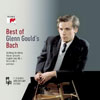 Bach: “Best of Glenn Gould’s Bach” Bach: “Best of Glenn Gould’s Bach”
Glenn Gould, piano
Sony 8872421762 (2 CD: 156 min 40 s; DVD: 57 min 55 s)

Glenn Gould passed away in Toronto on October 4, 1982, at the age of 50. To commemorate his passing, Sony recently put together three already-known DVDs in a box set, one of which was the unforgettable one dedicated to the performance of the Goldberg Variations filmed in 1981 by Bruno Monsaingeon. The current collection includes two CDs and one DVD accompanied by a small booklet bound together and illustrated by 18 rare pictures of the Canadian pianist. As for the music, nothing is especially new, since the DVD repeats the same Goldberg Variations and the CD reuses old recordings, some of which appear in the aforementioned box set. The program is indeed considerable but for the most part just a catch-all. There are many excerpts, from the Inventions and the Well Tempered Clavier in particular, but also some complete works, like the First Partita, the Third English Suite and the Concerto in F minor. The overview of Gould’s career shows that his art took off immediately, and that his stylistic eccentricities will continue to irritate more than one listener. They can, at least, claim the merit of presenting a different Bach, one could say. Aside from a fairly dull Chromatic Fantasy (played without the Fugue!), this is a nonetheless spectacular collection. Alexandre Lazaridès
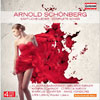 Schoenberg: Complete Songs Schoenberg: Complete Songs
Claudia Barainsky & Melanie Diener, sopranos; Anke Vondung, mezzo-soprano; Christa Mayer, contralto; Markus Schäfer, tenor; Konrad Janrot, baritone; Urs Liska, piano
Capriccio 7120 (4CD: 4h 43 min 40 s)

The amount of Arnold Schoenberg’s lieder in the music scene and even in the recorded world is to this day negligible, perhaps due to the common fear of being confronted with a compilation of miniature Pierrot Lunaire’s! Unfortunately so, since they are for the most part very accessible, and were mostly written at the start of the composer’s career. Stylistically, the pieces range from his youthful Romanticism to scholarly post-Wagnerism to the dense aesthetic of the Gurrelieder. Only a handful of cycles, the most important being Das Buch der hängenden Gärten (the Book of the Hanging Gardens) use atonality as an expressive vehicle, but are far from being as daunting as expected. The superb collection, heavily documented, showcases a plethora of melodies from the end of the 1890s, including the original version of the Gurrelieder for voice and piano, dating from 1901! A few cabaret songs, in addition to song cycles featuring three to eight pieces, complete a fascinating anthology. It is difficult to find such a detailed production on the market. The quality of the performers is undeniable, and the sound recording is excellent. A must-have. Frédéric Cardin
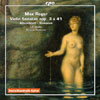 Reger: Violin Sonatas, Op. 3 & 41 -
Albumblatt – Romanze Reger: Violin Sonatas, Op. 3 & 41 -
Albumblatt – Romanze
Ulf Wallin, violin; Roland Pontinen, piano
CPO (64 min 36 s)

Over a decade ago, Swedish violinist Ulf Wallin and his compatriot Roland Pontinen resolved to devote themselves to Max Reger’s complete sonatas and works for violin. With this record, dedicated to the second and third sonatas, their journey is drawing to an end. Over the years, the musicians have literally become experts on the German composer’s chamber music. And it shows within the first few minutes. The formation, far from put together randomly, is a solid duo that has presumably spent phenomenal amounts of time rehearsing over and over again. Their playing is accurate in each movement. The record is, once again, pure aural pleasure from start to finish, allowing the listener to appreciate an instrumental formation particularly appreciated by Reger. The perfect sound recording simply makes every note all the more beautiful. Philippe Michaud
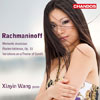 Rachmaninoff: Moments Musicaux/Études-Tableaux/etc. Rachmaninoff: Moments Musicaux/Études-Tableaux/etc.
Xiayin Wang, piano
Chandos CHAN10724 (69 min 18 s)

Wang is clearly seizing the opportunity that sharing her work between Naxos and Chandos labels has given her and taking the time to develop a more mature style of playing. Despite not having yet reached the metaphysical grace of the deepest meanings of the pieces, she has nonetheless managed to infuse a minimal degree of life into them, paired with a coherent and structured execution (especially in Variations sur un thème de Corelli, op. 42). Just as some of the more lively passages become vertiginous, especially in the high range, others are lost in a scramble camouflaged by pedal play, or broken up by excessive ritenuti. General imperfections are likely explained by a lack of strength in the shoulders and forearms and, yet again, musical maturity. But, Wang is young and progressing well, and therefore deserves a sizeable and dedicated following that will allow her, over time, to perfect her skills. René Bricault
 Tchaikovsky: Symphonies No. 2 & 3 Tchaikovsky: Symphonies No. 2 & 3
Deutsche Radio Philharmonie/Christoph Poppen
Oehms Classics OC762 (77 min 46 s)

Tchaikovsky can quickly become unbearable in a vague and pompous environment. Luckily, Poppen, as required by a fashion that is hard to kill, seeks a clarity and precision of lines that prove lifesaving. The polyphony of the winds comes out wonderfully well, demonstrating a full palate of colour without any doughy mixtures. However, the strings are shamelessly lost; we can barely hear the ensemble in their pianissimos. The sound quality isn’t worth mentioning, as (apart from the applause at the end of each symphony) it is inconsistent: no background noise, but no feelings of fevered passion either. Nevertheless, although the somewhat soporific flux is disappointing, we cannot wholly condemn this effort, which overall is very honest. René Bricault
DVD
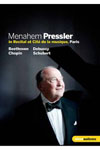 Récital: Beethoven, Chopin, Schubert, Debussy Récital: Beethoven, Chopin, Schubert, Debussy
Menahem Pressler, piano
Idéale Audience 3079664 (DVD : 88 min)

Menahem Pressler is none other than the remarkable chamber musician who, by means of his keyboard, brought to the Beaux Arts Trio the elegant brilliance that earned it its reputation for over half a century. Since the formation’s dissolution three years ago, Pressler has reconnected with his initial career as a concert performer. Among others, he gave a recital on March 23, 2011 in Paris at the Cité de la musique. Watching the octogenarian’s hands move over the keyboard is moving; however, it must be recognized that Pressler is no longer at his best. His fluidity is gone, and the longer works are lifeless under his hands, leaving a lot to be desired in Beethoven’s Sonata op. 110 and Schubert’s ultimate sonatas. Despite the emotion the pianist is clearly attempting to convey, the works come across as pieces skillfully stitched together. Debussy’s Estampes lacks the intended silkiness, and Chopin’s four pieces are easily forgotten. All the same, thank you Menahem Pressler. Alexandre Lazaridès
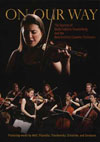 On Our Way: the Journey of Nadja Salerno-Sonnenberg and the New Century Chamber Orchestra On Our Way: the Journey of Nadja Salerno-Sonnenberg and the New Century Chamber Orchestra
Wolf: Italian Serenade. Piazzolla: Four Seasons of Buenos Aires. Tchaikovsky: Serenade for Strings
NSS Music DVD (93 min 19 s)

Nadja Salerno-Sonnerberg is known as one of the inspiring and idiosyncratic solo violinists of her generation. She plays with an intensity and an involvement that is often electrifying. She brings these same qualities to her work as leader of the San Francisco-based New Century Chamber Orchestra. Under her direction, this 19-member string orchestra has become a wonder to behold.
This self-produced CD includes a complete concert given at Broad Stage in Santa Monica in 2011, with excerpts from interviews interwoven with the music.
The Piazzolla was inspired by the well-known Vivaldi concertos and often quotes from them but then goes on to a series of tango riffs. The violin part is beyond difficult both technically and stylistically, and the piece also requires an orchestra of virtuosos. It is a great piece and here, it gets a spectacular performance.
Every string orchestra plays the Tchaikovsky Serenade. What is exceptional here is the subtly nuanced phrasing and the chamber music give and take. NSS has not given up solo playing but she has added an exciting new activity to her life and ours. Paul E. Robinson
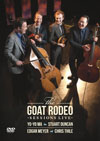 The Goat Rodeo Sessions Live The Goat Rodeo Sessions Live
Yo-Yo Ma, cello; Stuart Duncan, violin, mandolin, banjo; Edgar Meyer, double bass, piano; Chris Thile, mandolin, violin, guitar, banjo; Adife O’Donovan, voice
Sony Classical 88691 97465 9 (DVD: 55 min)

Yo-Yo Ma no longer needs to demonstrate his interest for traditional world music. His Silk Road Project created bridges that were seldom dreamt of between a classical Western chamber music aesthetic and shimmering musical traditions from Iran to China, passing through Central Asia and India. He also collaborated repeatedly with American folk and country musicians, as shown on the concert filmed at the Boston House of Blues in January 2012. Here, all-original compositions take up most of the repertoire, and are written by the traditional performers themselves (Edgar Meyer, a gripping “serious” contemporary composer, Chris Thile, one of the today’s best bluegrass and folk musicians and a banjo virtuoso, and Stuart Duncan, an extremely sophisticated and high-flying violinist). Only one piece is strictly classical: Bach’s Sonata No. 1 for Viola da Gamba. The intelligent, refined and open-minded musicians transform what could easily have been a collection of mainstream clichés into a state-of-the-art and stimulating experience of a new genre of “contemporary music.” The music is resolutely tonal and deeply anchored in the roots of rural America, but no less original nor innovative for it. If you are looking to get a feeling for one of the many “neo-scholarly” expressions of the post-atonal world geared towards a “broader public,” this DVD should provide you with an accurate first impression.
Blu-ray
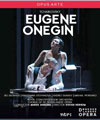 Tchaikovsky: Eugene Onegin Tchaikovsky: Eugene Onegin
Bo Skovhus (Eugene Onegin); Andrej Dunaev (Lenski); Mikhail Petrenko (Prince Gremin); Krassimira
Stoyanova (Tatiana); Chorus of the De Nederlandse Opera; Royal Amsterdam Concertgetbouw Orchestra/Mariss Jansons
Philipp Fürhofer, set; Gesine Völlm, costumes; Stefan Herheim, staging
Opus Arte OA BD7100D (151 min + 30 min. bonus)

This 2011 production of the Nederlandse Opera was literally all the rage. Producer Stafan Herheim’s novel vision, although controversial for certain purists, illuminated in a completely different way the libretto based on the Pushkin classic. It is like wandering through a temporal kaleidoscope that takes us back to the beginning of the 20th century, walks us through Soviet communism and ends in our era. The costumes are sumptuous and filled with allusions, the decor, exhilarating and marvellously coloured, and the direction of the singers, lively despite the static libretto, making the production unforgettable. And as if that weren’t enough, Mariss Jansons brings flamboyance and dynamic gems out of the Dutch orchestra. The soloists’ voices are impeccable. A very, very high artistic level. If you like opera in general, and Tchaikovsky in particular, you simply cannot miss out on this spectacular Blu-ray. Frédéric Cardin
Translation: Rebecca Clark, Catherine Hine, Rona Nadler, Karine Poznanski
Version française... |
|


